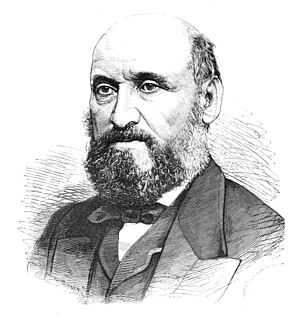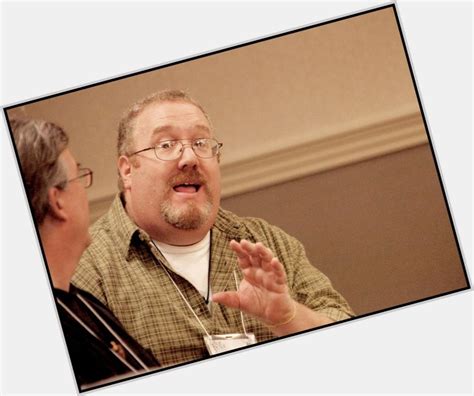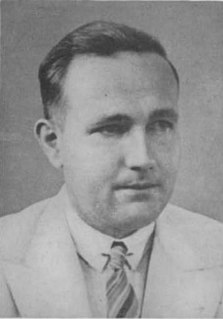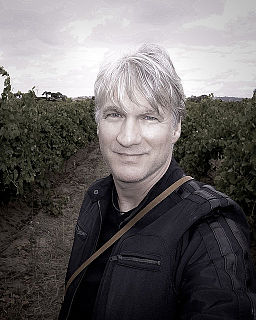Top 241 Depart Quotes & Sayings - Page 4
Explore popular Depart quotes.
Last updated on December 19, 2024.
In philosophy, when we make use of false principles, we depart the farther from the knowledge of truth and wisdom exactly in proportion to the care with which we cultivate them, and apply ourselves to the deduction of diverse consequences from them, thinking that we are philosophizing well, while we are only departing the farther from the truth; from which it must be inferred that they who have learned the least of all that has been hitherto distinguished by the name of philosophy are the most fitted for the apprehension of truth.
I heard the prophet Joseph Smith say the time would come when this nation would so far depart from its original purity, its glory, and its love for freedom and its protection of civil rights and religious rights, that the Constitution of our country would hang as it were by a thread. He said, also, that this people, the sons of Zion, would rise up and save the Constitution and bear it off triumphantly.
Who can depart from his pain and aloneness without regret? Too many fragments of the spirit have I scattered in these streets, and too many are the children of my longing that walk naked among these hills, and I cannot withdraw from them without a burden and an ache. It is not a garment I cast off this day, bit a skin that I tear with my own hands... Yet I cannot tarry longer.
I know I shall not live very long. But why is that so sad? Is a festival more beautiful because it lasts longer? My sensuous perceptions grow sharper, as if I were supposed to take in everything with the few years that will be offered to me ... And now love will still blossom for me before I depart, and if I've painted three good pictures, then I shall leave gladly with flowers in my hand and my hair.
Remember, too, every day, and whenever you can, repeat to yourself, Lord, have mercy on all who appear before Thee today. For every hour and every moment thousands of men leave life on this earth, and their souls appear before God. And how many of them depart in solitude, unknown, sad, dejected that no one mourns for them or even knows whether they have lived or not!
Sci-fi and horror, particularly, allow a storyteller to depart from, let's say, the demands of cinema verite or kitchen-sink realism or, even, just relatable dramas and can go into areas that are either - in the case of horror - more primally effective or, in the case of sci-fi, more speculative or imaginative.
You should rather suppose that those are involved in worthwhile duties who wish to have daily as their closest friends Zeno, Pythagoras, Democritus and all the other high priests of liberal studies, and Aristotle and Theophrastus. None of these will be too busy to see you, none of these will not send his visitor away happier and more devoted to himself, none of these will allow anyone to depart empty-handed. They are at home to all mortals by night and by day.
The most important thing is practice in daily life; then you can
know gradually the true value of religion. Doctrine is not meant for
mere knowledge, but for the improvement of our minds. In order to do
that, it must be part of our life. If you put religious doctrine in
a building and when you leave the building depart from the practices,
you cannot gain its value.
Since it is possible that thou mayest depart from life this very moment, regulate every act and thought accordingly. But to go away from among men, if there are gods, is not a thing to be afraid of, for the gods will not involve thee in evil; but if indeed they do not exist, or if they have no concern about human affairs, what is it to me to live in a universe devoid of gods or devoid of Providence? But Gods there are, undoubtedly, and they regard human affairs; and have put it wholly in our power, that we should not fall into what is truly evil.
LOVE'S SECRET Never seek to tell thy love, Love that never told can be; For the gentle wind doth move Silently, invisibly. I told my love, I told my love, I told her all my heart, Trembling, cold, in ghastly fears. Ah! she did depart! Soon after she was gone from me, A traveller came by, Silently, invisibly: He took her with a sigh.
People leave because of their own overts and withholds. That is the factual fact and the hard-bound rule. A man with a clean heart can’t be hurt. The man or woman who must must must become a victim and depart is departing because of his or her own overts and withholds. It doesn’t matter whether the person is departing from a town or a job or a session. The cause is the same.
But this is not difficult, O Athenians! to escape death; but it is much more difficult to avoid depravity, for it runs swifter than death. And now I, being slow and aged, am overtaken by the slower of the two; but my accusers, being strong and active, have been overtaken by the swifter, wickedness. And now I depart, condemned by you to death; but they condemned by truth, as guilty of iniquity and injustice: and I abide my sentence, and so do they. These things, perhaps, ought so to be, and I think that they are for the best.
The advantages of a uniform statistical nomenclature, however im- perfect, are so obvious, that it is surprising no attention has been paid to its enforcement in bills of mortality. Each disease has in many instances been denoted by three or four terms, and each term has been applied to as many different diseases ; vague, inconvenient names have been employed, or complications have been registered, instead of primary diseases. The nomenclature is of as much importance in this depart- ment of inquiry as weights and measures in the physical sciences, and should be settled without delay.
He (George W. Bush) should depart. He should go away from the presidency and let the Americans lead an ordinary life with other nations, not a life of aggression, a policy of aggression against other nations. This policy has brought about disasters to the U.S. So for the U.S. to live properly with the world and for the world nations to live in peace, this crazy man should go.
To me, the thing that sets us apart from so many other animal species is our ability to ask questions, investigate, gather information, come to our own conclusions, and sometimes depart from the pack, sometimes move away from the tribe. And I'm not seeing a lot of that right now among a sizable portion of American politics and American voters. I'm not seeing that kind of use of critical thinking, and it really, really freaks me out.
If we could imagine such a man, that is a man who could invent the fly and send him out on his mission and furnish him with his orders: Depart into the uttermost corners of the earth and, diligently do your appointed work. Persecute the sick child, settle upon its eyes, its face, its hands, and gnaw and pester and sting, worry and fret and madden the worn and tried mother who watches by the child and humbly prays for mercy and relief with the pathetic faith of the deceived and the unteachable.
We have a friend and protector, from whom, if we do not ourselves depart from Him, nor power nor spirit can separate us. In His strength let us proceed on our journey, through the storms, and troubles, and dangers of the world. However they may rage and swell, though the mountains shake at the tempests, our rock will not be moved: we have one friend who will never forsake us; one refuge, where we may rest in peace and stand in our lot at the end of the days. That same is He who liveth, and was dead; who is alive forevermore; and hath the keys of hell and of death.
In life, a person will come and go from many homes. We may leave a house, a town, a room, but that does not mean those places leave us. Once entered, we never entirely depart the homes we make for ourselves in the world. They follow us, like shadows, until we come upon them again, waiting for us in the mist.
When you depart from standard usage, it should be deliberate and not an accidental lapse. Like a poet who breaks the rules of poetry for creative effect, this only works when you know and respect the rule you are breaking. If you have never heard of the rules you are breaking, you have no right to do so, and you are likely to come off like a buffoon or a barbarian. Breaking rules, using slang and archaic language can be effective, but it is just as likely to give you an audience busy with wincing.
Why had we come to the moon? The thing presented itself to me as a perplexing problem. What is this spirit in man that urges him for ever to depart from happiness and security, to toil, to place himself in danger, to risk an even a reasonable certainty of death? It dawned upon me that there in the moon as a thing I ought always to have known, that man is not made to go about safe and comfortable and well fed and amused. ... against his interest, against his happiness, he is constantly being driven to do unreasonable things. Some force not himself impels him, and he must go.
You cannot count on the physical proximity of someone you love, all the time. A seed that sprouts at the foot of its parent tree remains stunted until it is transplanted. Rama will be in my care, and he will be quite well. But ultimately, he will leave me too. Every human being, when the time comes, has to depart to seek his fulfillment in his own way.
What I really enjoy is not you; it's something that's greater than both you and me. It is something that I discovered, a kind of symphony, a kind of orchestra that plays one melody in your presence, but when you depart, the orchestra doesn't stop. When I meet someone else, it plays another melody, which is also very delightful. And when I'm alone, it continues to play.
Not my idea of God, but God. Not my idea of H., but H. Yes, and also not my idea of my neighbour, but my neighbour. For don't we often make this mistake as regards people who are still alive -- who are with us in the same room? Talking and acting not to the man himself but to the picture -- almost the précis -- we've made of him in our own minds? And he has to depart from it pretty widely before we even notice the fact.
O ye that love mankind! Ye that dare oppose, not only the tyranny, but the tyrant, stand forth! Every spot of the old world is overrun with oppression. Freedom hath been hunted round the globe. Asia, and Africa, have long expelled her. Europe regards her like a stranger, and England hath given her warning to depart. O! receive the fugitive, and prepare in time an asylum for mankind.
Sunsets are loved because they vanish. Flowers are loved because they go. The dogs of the field and the cats of the kitchen are loved because soon they must depart. These are not the sole reasons, but at the heart of morning welcomes and afternoon laughters is the promise of farewell. In the gray muzzle of an old dog we see goodbye. In the tired face of an old friend we read long journeys beyond returns.
I have great assurance when I study my own conversion, when I discuss it with other men, when I look over the 25 years of my pilgrimmage with Christ; I have great assurance of having come to know Him. But even now, if I were to depart from the faith and walk away and keep going in that direction into heresy and worldiness, it could be the greatest of proofs that I never knew Him, that the whole thing was a work of the flesh.
Just as the children of Israel were directed by God to depart from the land of their oppression with its tyrannical monarch, cross a great sea, and establish a new nation, so, too, the children of Great Britain were led by God to leave the land of their religious oppression, cross a great ocean, inhabit a promised land, and, eventually, resist a "tyrannical" George III and create a new nation in "God's American Israel."
The devil is not fighting religion. He's too smart for that. He is producing a counterfeit Christianity, so much like the real one that good Christians are afraid to speak out against it. We are plainly told in the Scriptures that in the last days men will not endure sound doctrine and will depart from the faith and heap to themselves teachers to tickle their ears. We live in an epidemic of this itch, and popular preachers have developed “ear-tickling” into a fine art.
Compare mathematics and the political sciences - it's quite striking. In mathematics, in physics, people are concerned with what you say, not with your certification. But in order to speak about social reality, you must have the proper credentials, particularly if you depart from the accepted framework of thinking. Generally speaking, it seems fair to say that the richer the intellectual substance of a field, the less there is a concern for credentials, and the greater is the concern for content.
The foundation of the Christian's peace is everlasting; it is what no time, no change can destroy. It will remain when the body dies; it will remain when the mountains depart and the hills shall be removed, and when the heavens shall be rolled together as a scroll. The fountain of His comfort shall never be diminished, and the stream shall never be dried. His comfort and joy is a living spring in the soul, a well of water springing up to everlasting life.
All our knowledge merely helps us to die a more painful death than the animals that know nothing. A day will come when science will turn upon its error and no longer hesitate to shorten our woes. A day will come when it will dare and act with certainty; when life, grown wiser, will depart silently at its hour, knowing that it has reached its term.
We will be able to depart this life with the quiet peace-giving notion, that we were permitted to contribute to the happiness of many who will live after us. In our long lives we endeavored to unfold the collective consciousness. In our lives we have known hell and heaven; the final balance, however, is that we helped pave the way to dynamic harmony in this earthly house. That, I believe, is the meaning of this live.
The Master said, "Wealth and honor are things that all people desire, and yet unless they are acquired in the proper way I will not abide them. Poverty and disgrace are things that all people hate, and yet unless they are avoided in the proper way I will not despise them. If the gentleman abandons ren, how can he be worthy of that name? The gentleman does not violate ren even for the amount of time required to eat a meal. Even in times of urgency or distress, he does not depart from it."
Of course you lose track of where you are sometimes, as you finish a show and ride in a tour bus from anywhere from 3 -12 hours and wake up in another city, and check into a hotel. So, I woke up after a few hours, packed all my stuff up and headed for the bus to depart for that day's show. I get to the lobby and our production person looked at me and said, "where are you headed?" - It was a day off!
...the Bible itself is less read than preached, less interpreted than brandished. Increasingly, pastors may drape a limply bound Book over the edges of the pulpit as they depart from it. Members of the congregation carry Bibles to church services; the paster announces a long passage text for his sermon and waits for people to find it, then reads only the first verse of it before he takes off. The Book has become a talisman.
There are all sorts of institutions in the economic world which depart from the simple price/market model which I worked on in an earlier incarnation and which has been sort of the mainstream of economic theories since Adam Smith and David Ricardo. There are all sorts of contractual relations between firms and individuals which do not conform to the simple price theory - profit-sharing schemes and so forth - and the explanation for these suddenly became clear. We now understand why these emerged and that they are based on differences in information in the economy.
Oh that God would give me the thing which I long for! That before I go hence and am no more seen, I may see a people wholly devoted to God, crucified to the world, and the world crucified to them. A people truly given up to God in body, soul and substance! How cheerfully would I then say, 'Now lettest thou thy servant depart in peace.'
Grace comes immediately to meet some of those who strive, giving them assurance of the earnest of their inheritance (cf. Eph. 1:14), letting them taste the promised prizes, as if stretching out a loving hand to welcome them and anointing them for further struggles. With others, however, grace waits for the end of the struggle, and prepares for them the crown of patience as well. As one of the God-bearing Fathers says, 'Some receive holy rewards before their labours, some during labours, and some when they depart' (St. John Climacus).
If an organised body is not in the situation and circumstances best adapted to its sustenance and propagation, then, in conceiving an indefinite variety among the individuals of that species, we must be assured, that, on the one hand, those which depart most from the best adapted constitution, will be most liable to perish, while, on the other hand, those organised bodies, which most approach to the best constitution for the present circumstances, will be best adapted to continue, in preserving themselves and multiplying the individuals of their race.
And Gandalf said: "This is your realm, and the heart of the greater realm that shall be. The Third Age of the world is ended, and the new age is begun; and it is your task to order its beginning and to preserve what must be preserved. For though much has been saved, much must now pass away; and the power of the Three Rings also is ended. And all the lands that you see, and those that lie round about them, shall be dwellings of Men. For the time comes of the Dominion of Men, and the Elder Kindred shall fade or depart.
I felt naked. I felt as perhaps a bird may feel in the clear air knowing the hawk wings above and will swoop. I began to feel the need of fellowship. I wanted to question, wanted to speak, wanted to relate my experience. What is this spirit in man that urges him forever to depart from happiness, to toil and to place himself in danger?
As riches increase and accumulate in few hands, as luxury prevails in society, virtue will be in a greater degree considered as only a graceful appendage of wealth, and the tendency of things will be to depart from the republican standard. This is the real disposition of human nature; it is what neither the honorable member nor myself can correct. It is a common misfortunate that awaits our State constitution, as well as all others.
[Science] dissipates errors born of ignorance about our true relations with nature, errors the more damaging in that the social order should rest only on those relations. TRUTH! JUSTICE! Those are the immutable laws. Let us banish the dangerous maxim that it is sometimes useful to depart from them and to deceive or enslave mankind to assure its happiness.
See to it, night and day, that you pray for your children. Then you will leave them a great legacy of answers to prayer, which will follow them all the days of their life. Then you may calmly and with a good conscience depart from them, even though you may not leave them a great deal of material wealth.
A stone lies in a river; a piece of wood is jammed against it; dead leaves, drifting logs, and branches caked with mud collect; weeds settle there, and soon birds have made a nest and are feeding their young among the blossoming water plants. Then the river rises and the earth is washed away. The birds depart, the flowers wither, the branches are dislodged and drift downward; no trace is left of the floating island but a stone submerged by the water; - such is our personality.
Memory, faith, and the natural world as both witness to the cycle of human life and healer to a questioning heart are at the core of this lovely and lyrical collection of poems. The weather changes, people come and go from cities and towns, babies are born, grow up and depart from their parents’ arms, but still, the countryside and its rituals sustain the people and creatures who know how to read the signs of the seasons. In these pages, Laura Grace Weldon shares those signs with us; her poems are the fruit of a wonderful harvest.
Men are very apt to run into extremes, hatred to England may carry come into an excess of Confidence in France... I am heartily disposed to entertain the most favourable sentiments of our new ally and to cherish them in others to a reasonable degree; but it is a maxim founded on the universal experience of mankind, that no nation is to be trusted farther than it is bound by its interest; and no prudent statesman or politician will venture to depart from it.
We're not really afraid to die. We're only afraid of being forgotten. We know that we'll be forgotten, and the idea is unbearable, don't you agree? As time passes we become infrequent visitors in the minds of those left behind. The ones who clear out the house & divide up the belongings. Throw away the rubbish. And forget. If we knew that every evening someone lit a candle and sat down to think – thought about is if only for a few seconds – then we could depart this earth in peace. No-one will light a candle for me. Who would do that?
The Berkshire-style investors tend to be less diversified than other people. The academics have done a terrible disservice to intelligent investors by glorifying the idea of diversification. Because I just think the whole concept is literally almost insane. It emphasizes feeling good about not having your investment results depart very much from average investment results. But why would you get on the bandwagon like that if somebody didn't make you with a whip and a gun?
This person had arrived, he had illuminated her, he had ensorcelled her with notions of miracle and beauty, he had both understood and misunderstood her, he had married her, he had broken her heart, he had looked upon her with those sad and hopeless eyes, he had accepted his banishment, and now he was gone. What a stark and stunning thing was life- that such a cataclysm can enter and depart so quickly, and leave such wreckage behind!
The decision to let go of that which has completed its course in your experience is even more important than the decision to welcome new ideas. You cannot walk forward by looking backward. New wine cannot be put into old bottles, for the Bible states that the old bottles will break. You intuitively know what should depart from your life.
They are enthusiasts, devotees. Addicts. Something about the circus stirs their souls, and they ache for it when it is absent. They seek each other out, these people of such specific like mind. They tell of how they found the circus, how those first few steps were like magic. Like stepping into a fairy tale under a curtain of stars… When they depart, they shake hands and embrace like old friends, even if they have only just met, and as they go their separate ways they feel less alone than they had before.
It is not our affluence, or our plumbing, or our clogged freeways that grip the imagination of others. Rather, it is the values upon which our system is built. These values imply our adherence not only to liberty and individual freedom, but also to international peace, law and order, and constructive social purpose. When we depart from these values, we do so at our peril.
Many friends have said to me, 'I never know when you write your books, because I've never seen you writing, or even seen you go away to write.' I must behave rather as dogs do when they retire with a bone; they depart in a secretive manner and you do not see them again for an odd half hour. They return self-consciously with mud on their noses. I do much the same.
The more you have loved and have allowed yourself to suffer because of your love, the more you will be able to let your heart grow wider and deeper. When your love is truly giving and receiving, those whom you love will not leave your heart even when they depart from you. The pain of rejection, absence, and death can become fruitful. Yes, as you love deeply the ground of your heart will be broken more and more, but you will rejoice in the abundance of the fruit it will bear.
In a very real sense, the Constitution is our compact with history . . . [but] the Constitution can maintain that compact and serve as the lodestar of our political system only if its terms are binding on us. To the extent we depart from the document's language and rely instead on generalities that we see written between the lines, we rob the Constitution of its binding force and give free reign to the fashions and passions of the day.
We set up a certain aim, and put ourselves of our own will into the power of a certain current. Once having done that, we find ourselves committed to usages and customs which we had not before fully known, but from which we cannot depart without giving up the end which we have chosen. But we have no right, therefore, to claim that we are under the yoke of necessity. We might as well say that the man whom we see struggling vainly in the current of Niagara could not have helped jumping in.

























































